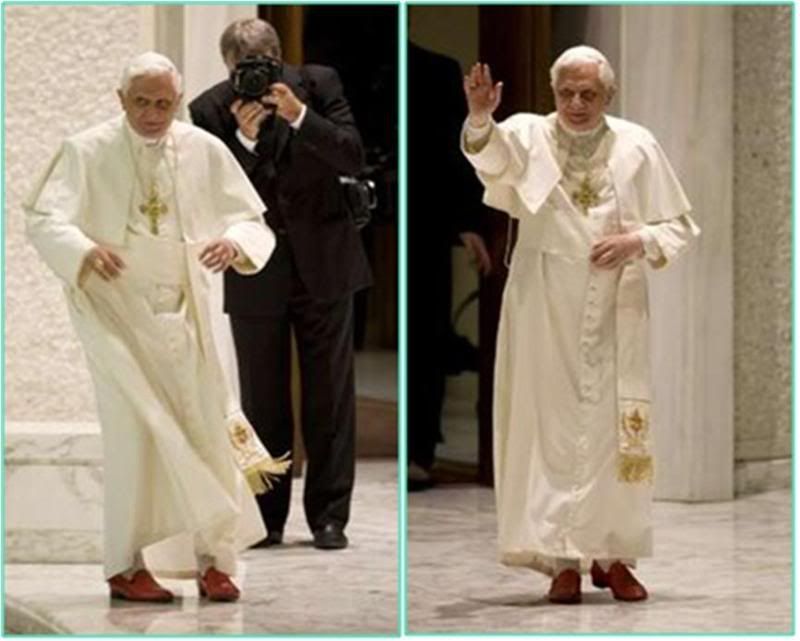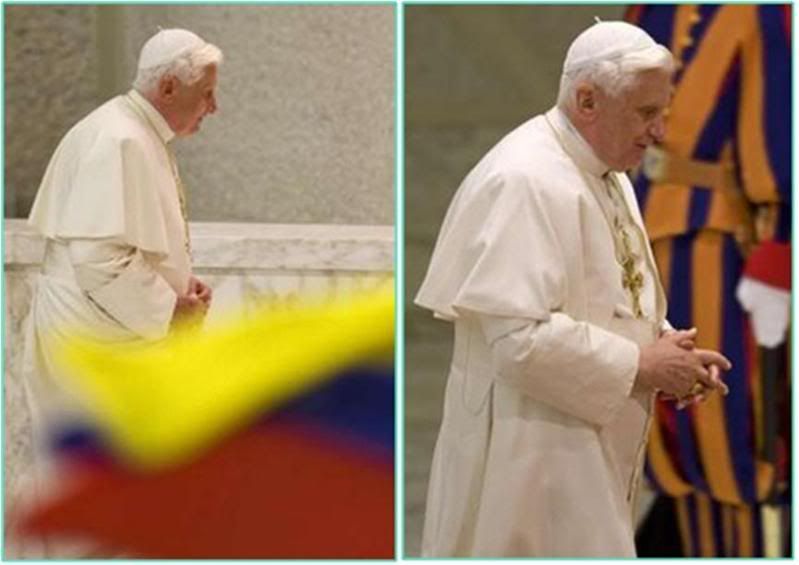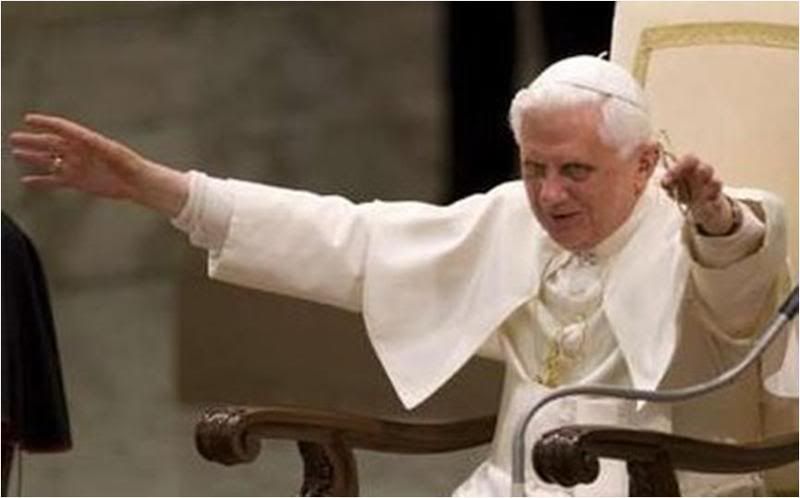 The Pope had his regular Wednesday Audience today. Thanks to the Ratzinger Forum for the quick translation and the pictures!!!
The Pope had his regular Wednesday Audience today. Thanks to the Ratzinger Forum for the quick translation and the pictures!!! Here is a translation of the Holy Father's discourse at the General Audience today held in Aula Paolo VI, in which he reports on his trip to France:
Here is a translation of the Holy Father's discourse at the General Audience today held in Aula Paolo VI, in which he reports on his trip to France: Dear brothers and sisters! Our encounter today gives me the welcome opportunity to review the various moments of the pastoral visit that I made recently to France. A visit that culminated, as you know, with a pilgrimage to Lourdes, on the occasion of the 150th anniversary of the appearances of Our Lady to St. Bernadette.
As I give fervent thanks to the Lord who has granted me this providential opportunity, I express again my sincere acknowledgements to the Archbishop of Paris, the Bishop of Tarbes-Lourdes, to their respective co-workers and to all who cooperated in various ways to the success of my pilgrimage. I also extend my heartfelt thanks to the President of the Republic [of France] and the other authorities who welcomed me with such courtesies.
The visit began in Paris, where I symbolically met with the entire French people, rendering homage to a beloved nation in which the Church, as early as the second century A.D., has played a fundamental role in its development. It is interesting that it is precisely in this context that the need matured for a healthy distinction between the political sphere and the religious, according to Jesus's famous saying: "Render to Caesar what belongs to Caesar, and to God what belongs to God" (Mk 12,17).
 If Caesar's image was impressed on Roman coins meaning that they were to be given to him, the imprint on the Creator, the only Lord of our life, is in the heart of man. Authentic secularity is, therefore, not to do without the spiritual dimension, but to acknowledge that it is precisely this, at the root, which is the guarantee of our freedom and of the autonomy of earthly realities, thanks to the dictates of the creative Wisdom that the human conscience can grasp and act upon.
If Caesar's image was impressed on Roman coins meaning that they were to be given to him, the imprint on the Creator, the only Lord of our life, is in the heart of man. Authentic secularity is, therefore, not to do without the spiritual dimension, but to acknowledge that it is precisely this, at the root, which is the guarantee of our freedom and of the autonomy of earthly realities, thanks to the dictates of the creative Wisdom that the human conscience can grasp and act upon.
This is the same context for the ample reflection I developed on "The origins of Western theology and the roots of European culture" in a meeting with the world of culture, in a place that was chosen for its symbolic value. This was at the College des Bernardins, which the lamented Cardinal Jean-Marie Lustiger, had envisioned as a center for cultural dialog - a 12th century edifice constructed by the Cistercian monks, where young people came to study.
It was the very presence of this monastic theology that was at the origin of our Western culture. My address started with a reflection on monasticism, whose purpose was to search for God - quaerere Deum. In a time of profound crisis for ancient civilization, the monks, oriented by the light of faith, chose the master way (via maestra): that of listening to the Word of God.
Thus they became the great custodians of Sacred Scriptures, and the monasteries became schools of wisdom and schools 'dominici servitii' - in the service of the Lord - as St. Benedict called them. The search for God, by its very nature, thus brought the monks to a culture of words. Quaerere Deum, to search for God - in the wake of his own Word. Therefore, they had to seek to know this Word ever more and profoundly. They had to penetrate the secret of language and understand it in its structure.
To search for God, revealed to us in Sacred Scriptures, the 'profane' sciences became important in trying to grasp the secret of languages. Thus, the monasteries developed that eruditio which allowed the formation of a culture. Because of this, 'quarere Deum', to be on the way towards God, remains today as in the past the 'via maestra' and the foundation of every true culture.

Architecture is an artistic expression of the search for God, and there is no doubt that the Cathedral of Notre Dame in Paris constitutes an architectural model of universal value. Within that magnificent temple, where I had the joy of presiding at the celebration of the Vespers for the Blessed Virgin Mary, I called on the priests, deacons, religions and seminarians who had come from all parts of France, to give priority to a religious listening to the divine Word, looking at the Virgin Mary as the sublime model.
In front of Notre Dame, I later greeted the young people, who came in large numbers and with enthusiasm. To them, who were about to start a long night vigil of prayer, I indicated two treasures of the Christian faith: the Holy Spirit and the Cross. The Spirit opens human intelligence to horizons which are beyond it and makes it understand the beauty and truth of the love of God as revealed in the Cross. It is a love from which nothing can ever separate us,and which we can experience in giving our own life following the example of Christ.
Then, I made a brief visit to the Institut de France, seat of the country's five national academies. Being a member of one of the academies, it was with great joy that I visited my colleagues. My visit to Paris was culminated by the Eucharistic Celebration on the Esplanade of the Invalides. Echoing the words of the Apostle Paul to the Corinthians, I invited the faithful of Paris and all of France to search anew for the living God who showed us his true face in Jesus who is present in the Eucharist, urging us to love our brothers just as he has loved us.
I then went to Lourdes, where I was able to join thousands of faithful on the Jubilee Way along the sites connected to the life of St, Bernadette: the parish church with the baptismal font where she was baptized; the 'Cachot' where, as a girl, she lived in great poverty; the Grotto of Massabielle, where the Virgin appeared to her 18 times. In the evening, I took part in the traditional torchlight procession ('aux flambeaux'), a stunning manifestation of faith in God and devotion to his Mother and ours. Lourdes is truly a place of light, of prayer, hope and conversion, founded on the rock of God's love, which had its culminating revelation in the glorious Cross of Christ.
By happy coincidence, last Sunday, the liturgy commemorated the Exaltation of the Holy Cross, the sign of hope par excellence, because it is the highest testimonial of love. In Lourdes, at the school of Mary, the first and perfect disciple of the Crucified Lord, the pilgrims learn to consider the crosses of their own life in the light of Christ's glorious Cross.
Appearing to Bernadette in the grotto of Massabielle, the first act of Mary was to make the Sign of the Cross, in silence, without words. And Bernadette imitated her, making the Sign of the Cross herself, with trembling hand. Thus, Our Lady provided a first initiation to the essence of Christianity: The Sign of the Cross is the sum of our faith, and in doing it with attentive heart, we enter into the full mystery of our salvation. In that act of the Madonna is found the entire message of Lourdes: God so loved us that he gave himself for us - this is the message of the Cross, "mystery of death and of glory".
The Cross reminds us that there is no true love without suffering, there is no gift in life without pain. Many learn this truth in Lourdes, which is a school of faith and hope, because it is also a school of charity and of service to one's brothers. It was in this context of faith and prayer that I had an important meeting with the French bishops - it was a moment of intense spiritual communion, during which together we entrusted to the Virgin our common pastoral expectations and concerns.
The next event was the Eucharistic procession with thousands of faithful among whom were so many sick pilgrims. Before the Blessed Sacrament, our spiritual communion with Mary became even more intense and profound because she makes our eyes and heart capable of contemplating her Divine Son in the Holy Eucharist. The silence of those thousands of people in front of the Lord was moving - not an empty silence, but one that was filled with prayer and awareness of the presence of the Lord, who loved us to the point of getting on the Cross for us.
On Monday, Sept. 15, liturgical commemoration of Our Blessed Lady of Sorrows, was dedicated especially for the sick. After a brief visit to the chapel of the hospital where Bernadette received her First Communion, I presided at the celebration of Mass in front of the Basilica of the Rosary, during which I administered unction to some of the sick. With the sick pilgrims and those who were present, I wanted to meditate on the tears that Mary shed under the Cross and on her smile which lit up Easter morning.
Dear brothers and sisters, let us thank the Lord together for this apostolic voyage that was rich in so many spiritual gifts. In particularly, let us give him praise because Mary, appearing to St. Bernadette, opened to the world a privileged space for encountering the divine love that heals and saves. In Lourdes, the Virgin Mary invites us all to consider the earth as a place of our pilgrimage towards our final homeland, which is Heaven. In truth, we are all pilgrims, and we need our Mother to guide us. In Lourdes, her smile invites us to go ahead with great confidence, in the knowledge that God is good, and God is love.
In English, he said:
Dear Brothers and Sisters, Our encounter today gives me the opportunity to retrace the steps of my recent Pastoral Visit to France. After a warm welcome in Paris, I met with men and women from the world of culture, with whom I reflected on the monastic ideal of seeking God — quaerere Deum — as the bedrock of European culture.
I wished to emphasize that meditation on the Scriptures opens our minds and hearts to the Logos, God’s Creative Reason in the flesh. In the magnificent Cathedral of Notre-Dame, I gathered with bishops, priests, religious and seminarians, sharing with them the treasures of the Holy Spirit and the Cross. My brief stop at the Institut de France was followed by the joyful Eucharistic celebration on the Esplanade des Invalides.
I then made my way to Lourdes to join thousands of pilgrims in this Jubilee year commemorating the apparitions of Our Lady to Saint Bernadette. The Holy Mass near the Grotto of Massabielle providentially coincided with the Feast of the Exaltation of the Cross, the perennial sign of the "mystery of death and of glory". The Cross demonstrates that God so loved the world that he gave us his only Son. I
t teaches us that there is no genuine love without suffering, and no gift of life without pain. Lourdes is thus a school of faith and hope because it is a school of charity and service. I am deeply grateful to God and to all who made this trip a blessed, memorable success. Thank you! I happily greet the English-speaking visitors present at today’s Audience, including pilgrims from England, Scotland, Ireland, Denmark, Australia, Burma, Japan, and the United States of America. God bless you all!
Do you know what his next foreign trip is??? I know his schedule is more circumspect than JP2 but I was wondering where I can get this information?
ReplyDeleteFidelis?
I will check. TO the best of my knowledge outside Europe no rip has been planned .Thogu people think Africa will be the next stop
ReplyDelete